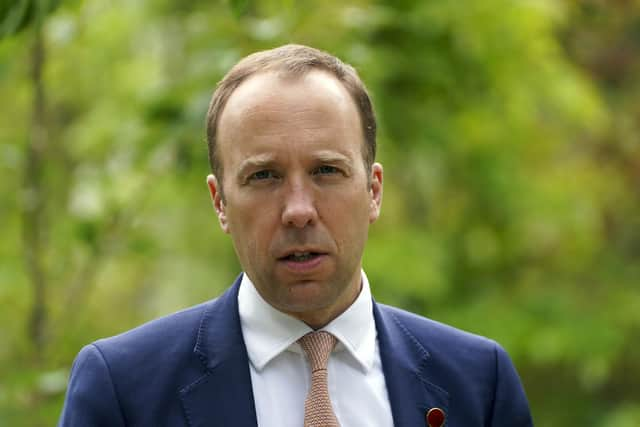Matt Hancock’s WhatsApp leaks show how policy making is determined has changed - Lord Blunkett
To most in the political arena, including those of us in Opposition, this appeared to be the first sign of common-sense statesmanship we have had for a very long time. Something which should boost the morale and therefore confidence of beleaguered Conservative MPs and, in the build-up to next week's budget, something to shout about.
Whilst, in the immediate aftermath, there was only a small uplift of 2 per cent in the opinion polls, it did, at least, offer some solace to a beleaguered government, and a smoother run-up to the 25th anniversary of the 1998 Good Friday Agreement.
Advertisement
Hide AdAdvertisement
Hide AdImportant not only in its own right, but also for our relationship with the United States.


Significantly, it also opened the way to what is called “Associate Status" with the European Union, enabling re-entry into the Horizon programme – which is vital to both cooperation and investment in research and development across boundaries.
But just as you think things might be stabilising for the Conservatives, along comes a couple of self-inflicted wounds. One highly predictable, the other a car crash waiting to happen.
The predictable was, of course, Boris Johnson. Seething away for a few days before attempting to discredit the achievements of the Prime Minister in reaching an agreement – not to mention his resignation honours list.
Advertisement
Hide AdAdvertisement
Hide AdThe second was Matt Hancock's WhatsApp messages and the staggering 2.3 million words passed to the Daily Telegraph by Isabel Oakeshott, a journalist Matt Hancock had enlisted to help him write his Covid Diaries.
She, having signed a Non-Disclosure Agreement, decided “in the public interest" to supply the paper with the whole caboodle. From Matt Hancock's point of view, this should also have been highly predictable. He should have known, as an experienced politician, that it was unwise to trust Isabel Oakeshott.
The important issue about the “Hancock Revelations", is not of long-term significance to the political fortunes of either the Conservatives or Labour, but rather the enormity of the change that has taken place in how government and policy making is determined.
Thank God that in my day there was no Twitter, no texting, and certainly no WhatsApp. Official communication was by meeting, phoning and, of course, old fashioned writing.
Advertisement
Hide AdAdvertisement
Hide AdLeave aside, for a moment, the gross waste of time involved in this modern form of messaging and concentrate instead on the long-term implications. It is certain that where crucial decisions have to be taken – including whether schools stayed open during periods of spasmodic lockdown or whether elderly people should be tested before going into residential care – they should be properly recorded and made available for both archiving and historical reference.
The reason is very simple. We need to learn from the past. We need to know how and when mistakes were made and, God willing, how best to avoid them in the future.
We need to learn about how government operates and how statecraft can be improved. We need to be able to teach future generations how to ‘do politics’ better, and we need the archive to make that possible.
But back to the impact on the here and now. All of this reminds me of 2009, because there is very little new in the way politics pans out.
Advertisement
Hide AdAdvertisement
Hide AdIn April of that year, Gordon Brown drew together the G20 largest countries and global institutions to discuss how to stop the international financial crash becoming a total catastrophe and therefore a worldwide recession. By everyone's agreement, including the then Head of the IMF, the President of the United States and others, this meeting was a great success – as was the immediate action taken after it (irrespective of the mistakes made later in terms of austerity measures – which had more to do with political ideology than an understanding of how economics works).
And here is the déjà vu. A month later, – yes, you’ve guessed it – the Daily Telegraph had a whole tranche of detail about MPs allowance claims which had been sold to them by someone who had been on the inside of processing what turned out to be a personal disaster for some, and a significant blow for trust in politics.
I ought to declare now that I wasn't caught up in this scandal, although the Daily Telegraph did give me only seven hours to prove that I hadn't over claimed. Thanks to the record keeping of my personal assistant, I was able to show that I had, in fact, under claimed.
Given the political hole in which the Conservative Party finds itself, it may well unite over the agreement on trading arrangements with Northern Ireland, and it may, in turn, be able to put diversions like Matt Hancock's WhatsApp messages behind it.
Advertisement
Hide AdAdvertisement
Hide AdBut if in next Wednesday's budget there is not a clear direction of travel, and if the measures announced do not command widespread support, then the suicide note – which has clearly already been circulated to MPs seeking to hold their seat next year – will, in political terms, be signed, sealed and delivered.
David Blunkett is a Labour Party politician, and served as the MP for Sheffield Brightside and Hillsborough.